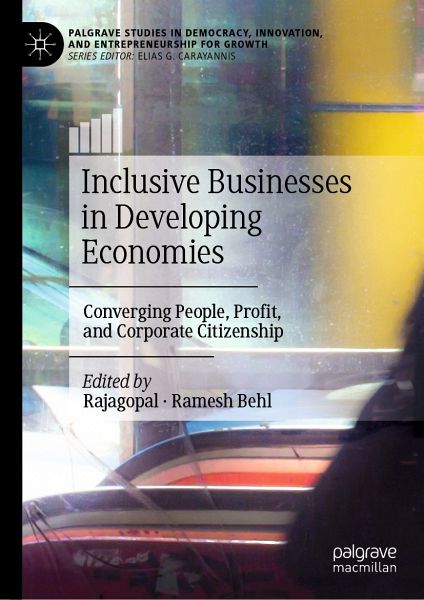
Inclusive Businesses in Developing Economies (eBook, PDF)
Converging People, Profit, and Corporate Citizenship
Redaktion: Rajagopal; Behl, Ramesh
Versandkostenfrei!
Sofort per Download lieferbar
136,95 €
inkl. MwSt.
Weitere Ausgaben:

PAYBACK Punkte
68 °P sammeln!
This book analyzes the emerging concepts and theories of inclusiveness in business by explaining corporate social responsibility, social learning, and value co-creation, as critical elements to the success of firms. The authors explore the causes and effects and challenges associated with the management of inclusive businesses.Divided in to six sections, this edited work includes twenty one chapters that examine the inclusive business philosophy, the social dynamics of managing inclusive business, the role of trade, and inclusive practices at work before concluding with a discussion of how to ...
This book analyzes the emerging concepts and theories of inclusiveness in business by explaining corporate social responsibility, social learning, and value co-creation, as critical elements to the success of firms. The authors explore the causes and effects and challenges associated with the management of inclusive businesses.
Divided in to six sections, this edited work includes twenty one chapters that examine the inclusive business philosophy, the social dynamics of managing inclusive business, the role of trade, and inclusive practices at work before concluding with a discussion of how to drive hybrid growth in these types of organizations.
Focusing on developing economies, this book portrays the varied corporate experiences in inclusive business designs and customer value propositions across the industries. It surveys the problems, possible solutions, and policy frameworks for integrating business as a resource to alleviate poverty and social and economic inequality.
Divided in to six sections, this edited work includes twenty one chapters that examine the inclusive business philosophy, the social dynamics of managing inclusive business, the role of trade, and inclusive practices at work before concluding with a discussion of how to drive hybrid growth in these types of organizations.
Focusing on developing economies, this book portrays the varied corporate experiences in inclusive business designs and customer value propositions across the industries. It surveys the problems, possible solutions, and policy frameworks for integrating business as a resource to alleviate poverty and social and economic inequality.
Dieser Download kann aus rechtlichen Gründen nur mit Rechnungsadresse in A, B, BG, CY, CZ, D, DK, EW, E, FIN, F, GR, HR, H, IRL, I, LT, L, LR, M, NL, PL, P, R, S, SLO, SK ausgeliefert werden.












